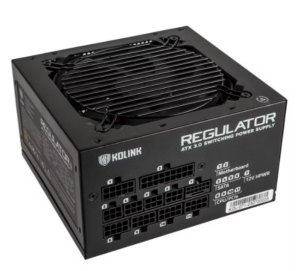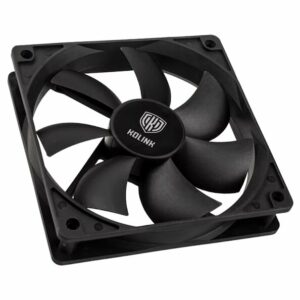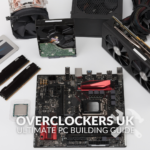To help you cut down your energy bill and save money, Overclockers UK is here to show you all the components and accessories you need to create a powerful, yet energy-efficient gaming PC. Along with some handy, built-in Windows features that can help cut down your computer’s electricity usage.

The Components
Efficient Power Supply:
A high-quality PSU won’t just supply power to all your important components, it can help cut down on your gaming PC’s energy usage. Investing in a power supply that has a high 80 Plus Rating, will deliver you a consistent, steady flow of power with a minimum of 80% energy efficiency.
There are six different 80 Plus Ratings, however, the best energy-efficient PSUs are gold, platinum, or titanium rated.

Seasonic Prime TX-750 750W 80 Plus Titanium Modular Power Supply:
- 750W
- Modular form factor
- 80 Plus Titanium Rating
Kolink Regulator 850W 80 Plus Gold Modular Power Supply:
- 850W
- Modular form factor
- 80 Plus Gold Rating

Efficient CPU:
Whilst you enjoy playing the latest AAA titles or watching your favourite streamers, your CPU is generating heat. The more heat produced, the higher the TDP. TDP is an acronym for ‘Thermal Design Power’. More heat requires more power in order for the CPU to stay cool and perform at optimum temperatures.

Intel Core i5 13400F CPU:
- Intel 13th Gen
- 10 cores and 16 threads
- 2.5GHz core clock speed
- 4.6GHz boosted clock speed
- 65W TDP
AMD Ryzen 5 7600 CPU:
- 6 cores & 12 threads
- Up to 5.10GHz boosted clock speed
- 32MB L3 cache
- 65W TDP

APU:
If you are looking to enjoy playing casual games at 1080p, why not consider an APU? An APU acts as both a CPU and graphics card, meaning if you don’t want to spend money on a dedicated graphics card, you don’t have to!

Intel Core i5-13400 APU:
- 10 cores & 16 threads
- Up to 4.6GHz boosted clock speed
- Integrated graphics
- 20MB cache
- 65W TDP
AMD Ryzen 5 8600G APU:
- 6 cores & 12 threads
- Integrated Radeon 780M graphics
- Boosted clock speed of up to 5.0GHz
- 65W TDP

RAM:
The latest gen of DDR5 RAM boasts huge improvements to memory bandwidth and module capacity, along with a decrease in power consumption and voltages. This makes it perfect for your energy-efficient PC as you can still take advantage of powerful RAM without putting too much strain on your energy bills.

Kingston Fury Beast 32GB (2x16GB) DDR5 Dual Channel RAM Kit:
- 2 x 16GB RAM modules
- DDR5
- 4800MHz RAM speed
Corsair Vengeance 32GB (2x16GB) DDR5 Dual Channel RAM Kit:
- 2 x 16GB RAM modules
- DDR5
- 5600MHz RAM speed

Storage Drives:
Compared to traditional HDDs, SSDs are far more energy-efficient. Solid State Drives are built with an integrated memory circuit, instead of mechanical moving parts. This means they won’t require as much power when reading or writing your data.

WD Black SN850X 1TB M.2 NVMe SSD:
- NVMe M.2 SSD
- 1TB storage capacity
- 7000MB/s read
- 5300MB/s write
WD Blue SA510 1TB SATA 2.5’’ SSD:
- 2.5” SATA SSD
- 1TB storage capacity
- 560MB/s read
- 520MB/s write

Cooling:
Keep all your hardware cool, whilst reducing your energy-consumption by including some high-quality fans inside your case. For maximum energy efficiency, we recommend PWM fans, as you can use the dedicated on/off cycles to adjust the speed and power of the fans.

Phanteks SK140 White dRGB PWM Triple Pack Fans:
- Triple pack
- PWM fans
- 140mm
- Up to 1500RPM
- Integrated dRGB lighting
Kolink Classic HDB PWM 120mm Fan:
- PWM fan
- 120mm case fan
- Up to 1500RPM
- Curved blades
- Includes PWM connector

Case:
Your powerful, yet energy-efficient gaming PC is incomplete without a stunning case to house all of your hardware.

Kolink Citadel Mesh Micro-ATX Case:
- Micro-ATX PC case
- Supports up to Micro-ATX motherboards
- Full mesh front panel
- Comes with 2 x pre-installed aRGB PWM fans
- Tempered glass side panel
Lian Li PC-O11 Dynamic Mid Tower Case:
- Mid Tower PC case
- Supports up to E-ATX motherboards
- Dual chamber design
- Tempered glass panels

The Accessories
Energy-Efficient Monitor:
Energy-efficient monitors, or ones with a dedicated Eco or ‘EnergyStar’ mode, have been designed to reduce power consumption. Especially when on standby.

ASUS TUF Gaming VG27VQ Gaming Monitor:
- 27” monitor
- 1920×1080 display resolution
- 165Hz refresh rates
- 1ms response time
- Dedicated power saving mode
USB Hubs:
To avoid any of those vampire devices draining electricity, you can invest in a USB Hub. These allow you to easily switch off any USB devices that are left on standby.
Streamplify USB Hub Deck 5:
- USB Hub
- 4 x USB 3.0 ports
- 1 x USB 2.0A port
- Integrated RGB lighting
- Swappable acrylic icons


Building your own gaming PC can be a daunting task. That’s why we’ve put together the Overclockers UK Ultimate PC Building Guide.
Adjust Your Windows Settings
Whether you use Windows 10 or 11, both these operating systems come with integrated features designed to improve your PC’s energy-efficiency.
You can adjust the power settings and select the plan that best suits your individual needs. Along with this, the dedicated ‘Power Saver’ mode, helps to cut down energy consumption by adjusting the performance of your PC.
What’s more, you can also adjust how long your monitor stays on after inactivity. You don’t need your display on full brightness whilst you are away making lunch or a quick cup of tea.
All Your Energy-Efficient Questions Answered
Why Should I Make My Gaming PC Energy-Efficient?
Creating an energy-efficient PC will reduce your household’s overall energy consumption. Helping you to save money by lowering your usage and cutting down your electricity bill.
How Much Energy Does a Gaming PC Use?
The average gaming PC, that has an 80 Plus Gold Rated 750W PSU, will cost £14.57 a month, or £174.84 a year.
This is only an estimation. The energy usage of a PC all depends on your hardware and what you are using it for.

If you want a complete breakdown of how much energy a gaming PC uses, then check out our dedicated blog post: ‘How Much Electricity Does a Gaming PC Use?’
How Much Energy Does a PC Use in Sleep Mode?
A standard gaming PC will use a maximum of 10W of power when in sleep mode. If you leave your computer in sleep for 10 hours, it will cost you £1.86 a month, or £22.32 a year.
This is an estimation. Similar to your PC’s overall energy usage, this depends on your hardware and what you are using it for. If you are downloading games, videos, or other media files whilst in sleep mode, it will require more power.
Ultimate Energy-Efficient Gaming Guide

Best Energy-Efficient PC and Peripherals

Best Hardware to Make Your PC More Energy-Efficient

Save Money with These Energy-Efficient Peripherals

Your Energy-Efficient PC Building Tips?
Got any tips about building an energy-efficient gaming PC? Share them in the comments below.
